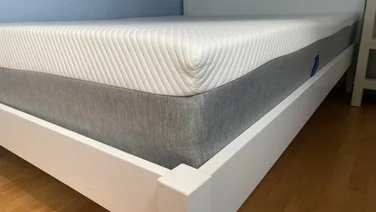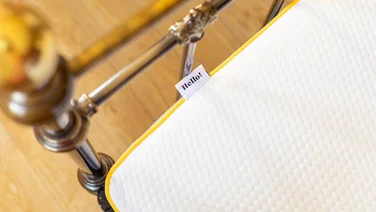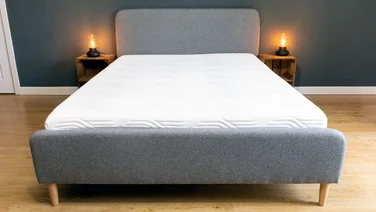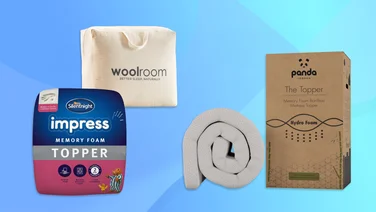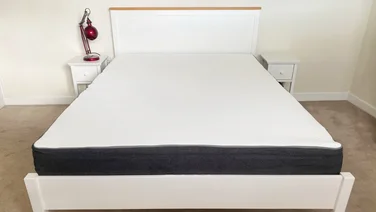To help us provide you with free impartial advice, we may earn a commission if you buy through links on our site. Learn more

Have you ever got back from a trip away and dreamed about that bed you slept in, wondering how you could recreate that blissful experience? Perhaps by investing in the very same mattress the hotel has used?
Many of us have, and increasingly brands are marketing their products as ‘hotel grade’ or creating specific ‘hotel collections’ so you can achieve that same five-star comfort at home.
However, if you’re unsure how to go about achieving a similar setup, we reveal where the world’s finest hotels buy their mattresses from, as well as exactly which firmness levels, materials and size they tend to plump for so that you can replicate the hotel experience in your own bedroom.
Only recently, we tested the Silentnight Premier Inn 2.0 Mattress – a slight adaptation of the mattress that adorns tens of thousands of hotel beds across the UK – and awarded it five stars. Proof, perhaps, that hotel endorsed mattresses can offer the ultimate in sleep comfort.
What brands of mattress do hotels prefer?
We spoke to Vanina Principi of VP7 Smart Hospitality to get her insider knowledge as to where the world’s best hotels shop for their mattresses. She’s worked in hospitality for more than 20 years and has worked with renowned brands including Soho House.
Vanina revealed that Savoir is a trusted staple at the illustrious London hotels The Savoy and Claridge’s. Savoir beds were first created for The Savoy Hotel in 1905 and have been slept on by the likes of Winston Churchill and Marilyn Monroe. Handcrafted with horsehair, wool, and cashmere, the iconic Savoir Nº2 mattress is still handmade in London to this day by master craftsmen, although it costs a pretty penny – prices start from £16,780 for this particular mattress. If you’re looking for something more affordable, Savoir’s Nº5 mattress (AKA The Savvy) starts from £2,440.

The Goring, however, opts for Vispring. “These hand-stitched mattresses use natural materials for an ultra-luxurious sleep,” says Vanina. According to Vispring, its mattresses can also be found at The Dorchester, The Pig Hotels, Beverly Hills Hotel and the Bvlgari Hotel in Beijing among others. “Entirely bespoke from start to finish, each one is tailor-made for that sumptuous, cloud-like comfort synonymous with the best luxury hotels,” adds Clare Schifano, Global Marketing Director, at Vispring.
At The Connaught you’ll find Sealy and Hypnos mattresses, which “provide a blend of support and indulgence for an elite sleep experience,” according to Vanina. Hypnos has worked with many hotel groups, including Hilton, Marriott, Pan Pacific, Soho House and Sofitel, holding a royal warrant for its commitment to quality craftsmanship.
For an eco-friendly and sustainable mattress, Naturalmat’s Superb mattress, from £1,430 for a single, is a popular pocket-sprung design that features at world-renowned hotels including the Six Senses and The Hoxton. “It combines hand-nested cotton pocket springs with organic wool and hypoallergenic natural latex, a chemical-free alternative to synthetic foam, sustainably derived from the sap of a Hevea Rubber tree,” explains Mark Tremlett, founder of Naturalmat.
What sizes of mattress do hotels use?
Often the mattress size will relate to the size and price of the room, with hotels commonly offering double and queen sizes for smaller, cheaper rooms, with king size upwards reserved for large rooms and luxurious suites. Having said that, when it comes to luxury hotels, most will offer a king or super king to provide the ultimate level of comfort.
“When advising homeowners, we recommend buying a bed as big as their space allows, and the same goes for hotels, where a roomy bed is essential for creating comfortable, restful and indulgent spaces,” says Schifano.

What materials are preferred for hotel mattresses?
Both Schifano and Tremlett point out that when it comes to mattresses, there’s a common thread that stitches the top hotel choices together and that’s the use of premium natural materials.
“Hotels with a commitment to guest comfort typically invest in mattresses made from natural materials such as wool, cashmere and silk, layered in between pocket springs, offering the perfect equilibrium between comfort and support,” explains Schifano. She says that these materials are also chosen for their longevity, promising comfort and durability for many years, even in high-turnover spaces such as hotels.
Tremlett also notes that natural materials such as wool are also preferred by luxury hotels thanks to their superior temperature control, as they help to ‘wick’ or draw away moisture and keep the body cool in summer and warm in winter. Wool is also far more durable than synthetic fibres, meaning that wool mattresses retain their shape and provide support, even with frequent use.
What firmness of mattress do hotels prefer and why?
Sleep is profoundly personal, so obviously there’s no one-size-fits-all scenario when it comes to mattresses. However, as hotels need to accommodate a wide range of guests with different needs, their mattresses need to be versatile and durable.
“Hotels tend to go for a medium firmness to suit most body types and sleeping positions without feeling overly soft or uncomfortably firm, while also being durable enough to accommodate a high turnover of guests,” says Schifano.
A medium mattress will allow for just enough sinkage to feel comfortable and provide some cushioning to relieve pressure points – important for side sleepers, back sleepers and those who tend to fidget and switch sleeping positions during the night.

How do hotels clean and maintain their mattresses?
Given how frequently hotel mattresses are slept on, it’s important for hotels to keep them in tip-top condition to lengthen their lifespan. This means regularly airing them, rotating them to minimise impression marks, flipping them over if applicable and vacuuming them, as well as checking them for any signs of wear and tear to see if they need replacing.
Hotels will often also use mattress protectors to prevent staining, as well as mattress toppers to provide additional comfort and also to help extend the life of the mattress, as these are cheaper to replace than the mattress itself.
“Mattress protectors are a hotel’s secret weapon,” says Robert Lancaster-Gaye, co-founder of Tielle. “Helping to catch crumbs and small spills before they sink into the mattress and protect against germs and mites, 2cm-deep luxury mattress protectors prolong the lifespan of the mattress and are much easier to clean than the actual mattress. They are fully machine washable although do require careful drying.”
According to Lancaster-Gaye, a mattress topper will sit between the mattress protector and the mattress, to add an extra layer of comfort for that hotel sleep experience and an additional layer of protection. “Some ultra five-star hotels go one step further,” reveals Lancaster-Gaye. “Between the mattress protector and the mattress topper, they’ll place a mattress pad. This is a thinner, denser product that helps to regulate body heat and adds another layer of protection for the mattress. Small spills won’t go through all of these layers, but bigger ones will.”
In terms of cleaning any stains, it’s very difficult to clean a mattress in a cost-effective way, according to Lancaster-Gaye. “If there’s a stain on the mattress that has gone through the sheet, the mattress protector, the mattress topper and cannot be spot cleaned, it is likely that that mattress will not be used again by the hotel.”

